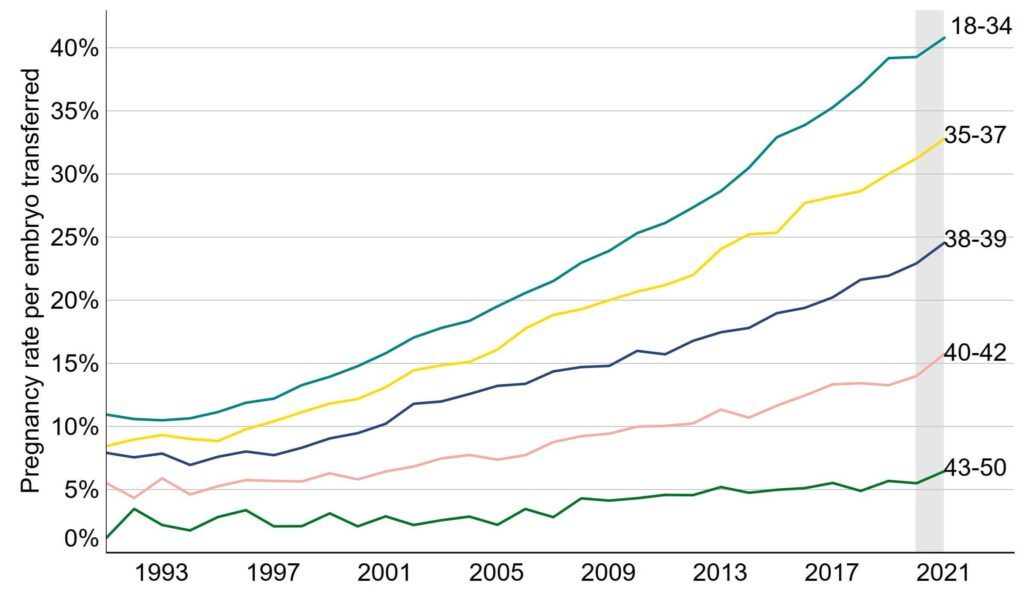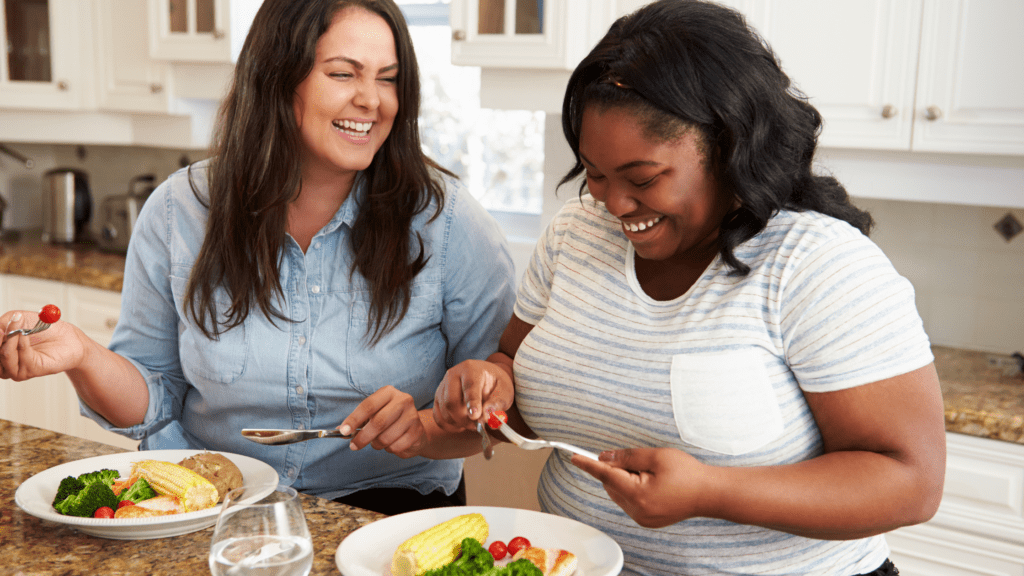Ultimate Guide: Getting Pregnant After 40

People in the UK are having children later in life. The Office for National Statistics shows that the average age of a first pregnancy is steadily increasing year on year. It currently sits at around 30.9 for females and 33.7 for males. The number of births to those over 45 increases each year too.
You might have children later in life for a variety of reasons. Waiting to find the right person, health issues, unknown infertility, focusing on your career, and the list goes on.
Whatever your situation is, you should get an understanding of the risks and options available to you if you are planning to start your family after 40.
Can I have a baby after 40?
Having a baby naturally at 40 is possible, and it is becoming more and more common. However, there are some physical factors and potential complications to consider.
Egg quality
As your age increases, your chances of natural conception decreases. Females are born with the number of eggs they will have throughout their life, approximately 400 000, of which, one is released each month during the menstrual cycle. Thousands of eggs are lost naturally over time.
The quality of these eggs begins to decline from your early 30s, and the decline in quality is accelerated from your mid-30s. From then onwards, your chance of getting pregnant might be affected. By the time you approach the menopause, the ‘bank’ of eggs will be low, and the quality of those left will be poorer than they were in your 20s or 30s.
Sperm quality
Males may also see a fertility decline from their 40s. Infertility in males is most commonly linked to sperm health, and from the age of 35, men will begin to see a decrease in sperm health. Males over 45 are 12.5 times more likely to take over two years to conceive. Sperm health is linked to sperm motility, morphology, count and DNA fragmentation.
Risks and complications
Your risk of complications and health issues increases for you and your baby as your age increases. Pregnancies at a later age can increase the chance of lower birth weight, the need for a c-section and chromosomal defects such as Down’s Syndrome.
Low birth weight
Your baby is more likely to have a low birth weight, which has the potential to contribute to poor health later in life.
Low-lying placenta
There is a chance that the placenta can stay low in the womb, this is called low-lying placenta or placenta praevia. It is when the cervix is either partially or completely blocked by the placenta obstructing the exit during birth.
High blood pressure
High blood pressure (hypertension) is more likely to affect those who get pregnant after 40. A 2015 study shows the risk of gestational hypertension was found to be 63 times higher in mothers aged 40 to 49 compared with the 25 to 29 year old participants.
Preeclampsia risks, which refers to issues with the blood circulating in the placenta, increases after the age of 40 and those with high blood pressure.
Miscarriage
Once you reach the age of 45, around half of pregnancies end in miscarriage. This is a heartbreaking statistic that causes physical and emotional stress to many.
If you are looking for advice on how to support your mental well-being or the support and guidance from experts. The IVF Network’s free membership will connect you with others in our welcoming community.

Fertility treatments
If you are struggling to get pregnant naturally, then you might want to consider other options. Other options can include surrogacy, using frozen eggs or IVF. If you are looking for more information The IVF Network has broadcasts, interviews and articles to help you with your fertility prognosis and real-life experience of fertility treatments. Read Christina’s IVF Story
Can I have IVF at 40?
More than one-fifth of women having in vitro fertilisation (IVF) in the UK are over the age of 40. So, the option for you to have IVF is available.
Funded IVF treatment is available on the NHS for those aged 40-42 and those below 40. Those aged 40-42 can be offered one cycle of IVF on the NHS, as long as those looking for treatment have never had IVF before. Have been having unprotected sex for over 2 years and show no evidence of low ovarian reserve.
Does age affect IVF success?
These are among the many reasons why women are increasingly turning to motherhood in their 40s and achieving this through fertility treatment.
More than a fifth of women having IVF in the UK are 40-plus, according to fertility watchdog the Human Fertilisation and Embryology Authority (HFEA). In the last few decades, the proportion of all IVF cycles to patients in this age bracket has more than doubled from 10% (689 cycles) in 1991 to 21% (14,761 cycles) in 2019.
The simple answer is ‘yes’ – and it’s a numbers game. The latest HFEA figures show that a woman aged 40 to 42 has a one in ten (11%) chance of a baby from every embryo transferred compared with 25% for patients aged 35 to 37.
Older mothers are statistically more likely to experience lower success rates from embryo transfer, than someone in their 20s and early 30s.

How can you test for egg quality?
At the moment, science hasn’t come up with an answer, although testing for quantity is possible. The clinic can also check the developing embryos during the IVF treatment process to see which ones are most likely to implant in your womb.
When IVF fails, it is often because embryos are abnormal, which reduces the chance of having a pregnancy or healthy baby. The eggs and resulting embryos of older patients are more likely to be affected in this way, for example with extra or missing chromosomes.
This is where a special technique called preimplantation genetic testing for aneuploidy (PGT-A) could help if you’re the other side of 40. It may sound a bit scary but how it works is fertility specialists – the embryology team – take a tiny number of cells from the embryo and test them. An important consideration with PGT-A is that you need enough embryos to choose from. If there’s only one, then there’s not much value in using this approach, and as yet, there’s no conclusive evidence that PGT-A increases the chance of a live birth.
As mentioned previously, your egg quality declines with age. That means your fertility consultant may need to extract more eggs in order to create a healthy embryo (and hopefully a baby) if you are older.
Freezing your eggs in your 40s for use later won’t fix this because the quality will already be poor when you put them ‘on ice’. However, this is distinct from embryo freezing where all developed embryos are frozen then transferred in the next IVF cycle. Studies have shown this technique may actually improve the baby odds.
Using donor eggs for IVF success
Of course, you may be reading this thinking how did all those smiling 40-something celebrities posing with cherubic newborns on Instagram manage it? Realistically many will have created their family, not with their own eggs but those donated by another woman. Opting for IVF using donor eggs may be a consideration if yours are failing to fertilise or the clinic cannot collect enough from you.
Another look at the HFEA data shows this increasingly popular approach could treble your chances of becoming a mother. With a 33% birth rate per embryo transferred among women in their early 40s (age 40 – 42) who used egg donation. For those in their mid to late 40s (45 – 50) the rate is significantly increased compared with using their own eggs (4%).
Can lifestyle and diet affect IVF success?
Diet and lifestyle play a significant role in your chances of getting pregnant and for the fertility of both partners. Especially when embarking on your IVF journey in your 40s. Taking care of your mind and your body through good nutrition and moderate exercise is key.
Top tips for improving your baby’s chances include:
- Maintaining a healthy weight
- Keeping alcohol to a minimum or cutting out altogether and
- Stocking up on vitamins and minerals, especially folic acid and vitamin D.
You can get these key vitamins from fertility supplements in addition to your diet. Fertility nutritionists suggest you eat a healthy balanced fertility diet. Rich in a variety of fruits and vegetables and low in processed food and caffeine.

Getting pregnant after 40 may increase your risk of getting gestational diabetes. You may need to have blood tests to confirm the presence of this health condition. A healthy diet and lifestyle can help to keep blood pressure low and provide the best health conditions for conception. If you do have gestational diabetes or any other pregnancy related complication. It is important you to get advice from your doctor or health care professional.
Getting support
Your GP and fertility specialist can help you with your geriatric fertility journey and offer professional advice on the next steps that work for you and your fertility needs.
If you want to learn more about the different types of fertility treatments or hear more about real-life stories. You can access IVFN experts on our broadcasts or meet real people who have been through it in our Safe Space area.
The IVFN recognise that the range of choices, clinics and options available for assisted conception, can sometimes feel overwhelming. Through our blog posts and dedicated content, our aim is to provide the information and advice you’ll need. Provided in a simple and non-biased way, to support you on your own fertility journey. Become a Member.